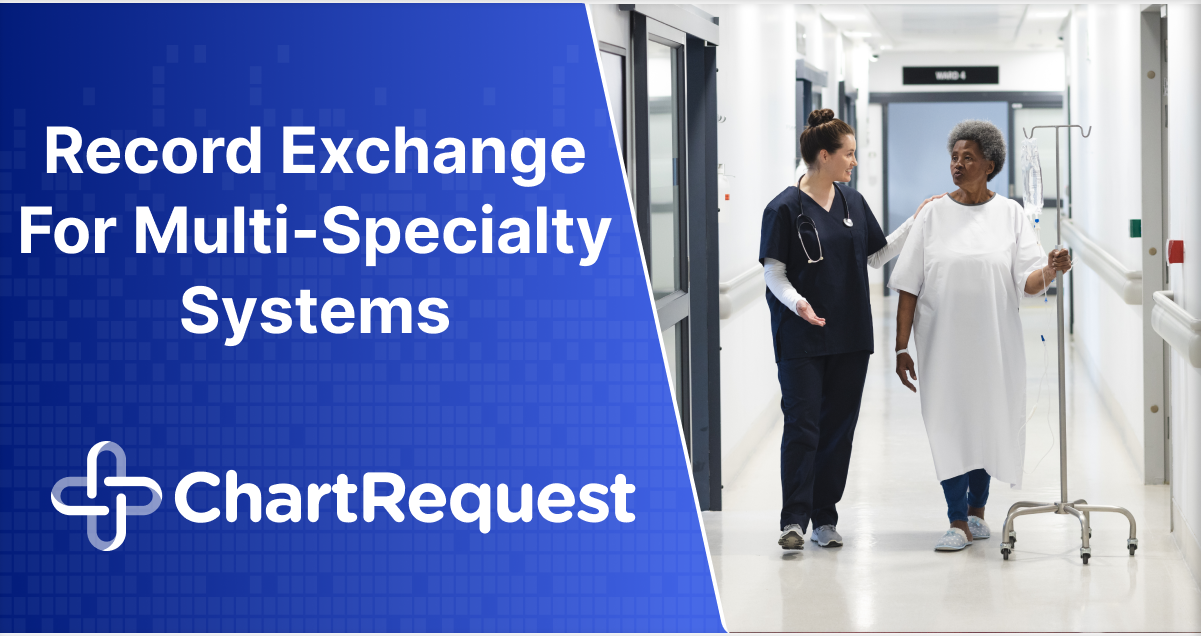Does your multi-specialty healthcare system struggle with smooth patient record exchange?
Inefficient record management between multiple providers can lead to fragmented care, delayed treatments, and operational inefficiencies. These challenges can get in the way of delivering excellent care outcomes.
Learn below how to move vital patient information across departments while staying compliant.
Discover the top-rated release of information solution.
Why Is Efficient Record Exchange Vital for Multi-Specialty Healthcare Systems?
Sharing accurate medical information across departments is critical when patients need care from multiple specialists. Inefficient data sharing can impact the quality of care and subject patients to duplicative tests and treatments.
Up to 63% of patient discharge summaries lack crucial diagnostic information. Incomplete data can also increase the chance of repeat testing during future patient admissions.
Consider patients managing chronic conditions like diabetes. They may need an endocrinologist, a cardiologist, and a nutritionist for effective treatment. An effective records exchange solution can enhance:
- Care coordination by providing all involved specialists with up-to-date information,
- Operational efficiency by automating record sharing,
- Patient satisfaction with well-coordinated treatments to ensure smoother healthcare journeys.
Benefits of Enhancing Records Exchange for Large Healthcare Systems
Solving record exchange challenges in multi-specialty healthcare delivers numerous benefits beyond administrative efficiency. When records flow seamlessly across departments, the healthcare system functions better and has lower operational costs.
Here are some other key benefits to enjoy when solving records exchange challenges:
- Your team can make informed care decisions with the correct data
- Your organization can save time, maximize budget, and improve the patient experience
- Patients experience fewer delays and a more cohesive care journey
Top Challenges of Record Exchange for Multi-Specialty Healthcare Systems
Multi-specialty healthcare systems provide patients with diverse treatment options. However, challenges occur when exchanging patient records across various specialties.
These hurdles can risk patient safety when ignored.
Recognizing and addressing common challenges is crucial for enhancing patient outcomes and boosting your practice’s reputation. Let’s explore the top challenges a multi-specialty healthcare system might face:
1. Data Silos and Interoperability Issues
Different specialties often use disparate electronic health record (EHR) systems that don’t communicate well with each other. Interoperability issues create data silos, making it hard to share patient information without bottlenecks.
Around 50% of healthcare providers face difficulties with EHR interoperability.
2. Technical Challenges With EHR Integration
Integrating multiple EHR systems can be a complex and resource-intensive process. In fact, physicians spend nearly 37% of their workday on EHR-related tasks.
Common technical issues include:
- Inconsistent data formats from different specialties and unique data requirements,
- Ensuring data remains accurate, complete, and up-to-date during integration,
- Legacy systems that do not integrate with modern EHR systems.
Eliminating physician paperwork is one of the best ways to prevent staff burnout and enable more face time with patients.
3. Burden of Manual Records Requests
Relying on manual processes for the release of information adds unnecessary administrative stress. Each manual request requires a meticulous approach to locate, verify, and prepare records.
Ask your staff if they spend too much time handling paperwork, making phone calls, and sending faxes to request and deliver patient records. If their answer is yes, the labor-intensive nature of manual record requests likely translates to higher costs for your business.
Solutions for Multi-Specialty Healthcare Systems
You can overcome the challenges of records exchange in your multi-specialty healthcare system with process-driven solutions.
The following innovations can enhance your care coordination, reduce operational costs, and improve patient outcomes:
Ensuring EHR System Interoperability Across Locations
In a multi-specialty setting, patients often see different specialists for various conditions. This method requires seamless communication across departments.
With interoperable EHR systems across locations, providers can instantly access a patient’s medical data. This solution eliminates the need for repetitive testing and allows providers to make informed decisions.
Utilizing Secure Cloud Storage
Secure cloud platforms boost the accessibility of patient records while maintaining high-security standards. This approach cuts costs and improves data backup and disaster recovery capabilities.
Cloud-based solutions also offer scalability. In other words, storage capacity can expand as healthcare systems grow across different locations.
Maintaining Standardized Data Formats
Your organization should implement uniform formats for storing and sharing patient information.
Standardized data formats eliminate the need for time-consuming conversions or manual data entry when transferring records.
Standardization also enhances communication between specialists, allowing them to collaborate on patient care. Access to the same information in a clear, structured format prevents misinterpretation.
Automating the Release of Information
Managing the sheer volume of record requests across departments can be overwhelming in multi-specialty healthcare systems. Automation is quickly becoming the key to simplifying this process.
Consider the following perks of automated procedures:
- Enhanced transparency: Some automated systems make it easy for requestors to get status updates without picking up the phone to call your team.
- Faster records sharing: Automation will accelerate the exchange of information between your healthcare departments.
- Reduced risk of errors: Automated tools reduce the likelihood of you or your team making mistakes during data transfers.
- Improved compliance: Automation can help ensure your records exchange follows HIPAA and other regulatory requirements.
Automating tedious mandatory processes like releasing medical, imaging, and billing records helps multi-specialty healthcare systems grow. When evaluating record exchange vendors, pick a solution that scales to support your lasting growth.
Automate the Compliant Release of Information With Our Experts
Records exchange solutions in multi-specialty healthcare systems advances every year. Yet, challenges like data silos, manual processes, and compliance issues continue to persist for many providers.
ChartRequest leads the evolution of modern records retrieval by offering secure, automated data management solutions driven by compliance experts. Our platform streamlines departmental workflows, ensuring healthcare providers like you have access to necessary information before an audit or patient visit.
Embrace the future of records exchange — Explore ChartRequest Solutions Today.


